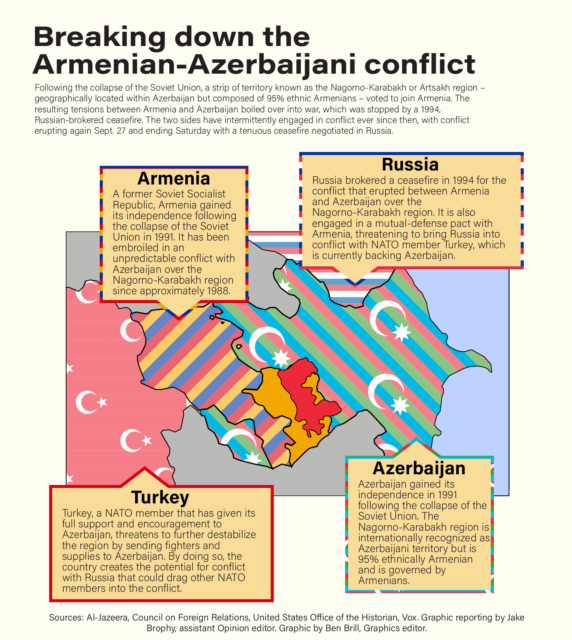This post was updated Oct. 18 at 7:33 p.m.
In times of crisis, it’s the university’s job to support its students.
But as it stands, UCLA’s silence on a pressing situation remains deafening.
Since late September, Armenia and Azerbaijan have been battling over the future of the Nagorno-Karabakh region, also known as Artsakh by Armenians. Some reports are saying that Azerbaijan was the instigator of the initial altercation, but both sides have blamed each other for the attacks that have led to another case of conflict within the region.
Nagorno-Karabakh has been a source of conflict for the two nations since 1988. While Armenians believe Nagorno-Karabakh is historically their land, Azerbaijan claims that Nagorno-Karabakh was taken by force decades ago by Armenian troops, and it is a matter of territorial integrity to have their country’s land reunited. Armenians currently make up the majority of the region’s population, despite it falling under the legal jurisdiction of Azerbaijan.
The conflict is currently contained to the region, but it could easily lead to interference from other nations. Turkey is a strong supporter of Azerbaijan and Russia has a treaty with Armenia stating it will defend them if the country is attacked.
UCLA is located near the cities of Glendale and Pasadena, homes to the largest populations of Armenians in the country. In recent weeks, Armenian Angelenos have led numerous protests to voice their pain and increase awareness of the current conflict.
And Armenian students at UCLA are no exception – they too are facing a lack of support from their university as they grapple with the emotional weight of witnessing their homeland communities under attack. A statement from UCLA won’t end the conflict, but it can at least display a much-needed show of support for its affected students during a troubling time.
Because for Armenian students, those affected by the ongoing conflict can be friends or family – constant worry is justified.
The historical factor of Armenians on the land since ancient times is central to understanding the conflict.
“We’re really talking about the self-determination of the Indigenous population, which is now defending itself against attack by the Azerbaijani republic,” said Peter Cowe, a UCLA professor of Armenian studies.
The mental toll of this struggle demands an exhaustive amount of time and attention – and the university certainly isn’t helping.
“It’s been overwhelming just in terms of emotions, just having that always running through your head,” said Derick Ambarsoomzadeh, a fourth-year economics student who serves as the political activism chair for UCLA’s Armenian Students’ Association.
Recognition from the university would not stop the bloodshed, but it could provide some semblance of institutional support. To have recognition from the school would show Armenian students that they are not alone in dealing with the trauma of seeing a war against their people.
“To not support Armenia and to turn a blind eye to this would be to turn a blind eye to injustice and a crime against humanity,” Ambarsoomzadeh said.
Other universities haven’t hesitated to let students know where they stand.
Occidental College’s vice president for student affairs and dean of students sent an email Friday to the university’s student body acknowledging the attack on Nagorno-Karabakh and the different ways Armenian students can receive support. UCLA can and must send a similar email to its student population to show it stands in solidarity.
This support should not stop with the university, however. Students also need to step up and support their Armenian peers. Ambarsoomzadeh encourages his peers to raise awareness through social media. This can shed light on the struggle Armenian students face and help amplify their voices.
“Currently, we are in talks with (the Undergraduate Students Association Council) to see if they can help broker a discussion with the administration to hopefully get a message of sustaining solidarity,” Ambarsoomzadeh said.
After all, students have created change on this front before. In 2015, USAC lobbied the University of California to divest University bonds from Turkey over its denial of the 1915 Armenian genocide, during which the Ottoman Empire killed 1.5 million Armenians. The state legislature passed that same proposal in the form of Assembly Bill 1320 last year.
But the UC Board of Regents was noticeably silent.
“If you’re talking about law, we have passed the resolution through the assembly,” said Gev Iskajyan, a board member for the Armenian National Committee of America and advocate of the divesting movement. “But in terms of the UC regents voting on it, they haven’t taken that call to action.”
It can be argued that the conflict does not affect most students. The conflict at its core is a humanitarian rights issue, which should be the concern of all students.
And once administrators acknowledge the conflict, they can finally begin to take concrete steps to assist Armenian students the best they can.
The university never misses a chance to boast about the support it offers their students.
In tumultuous times of conflict, Armenian students deserve that support more than ever.

